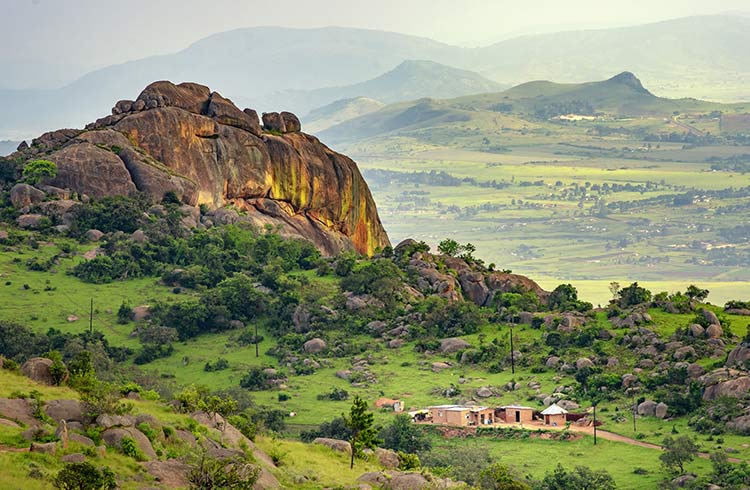Is eSwatini (Swaziland) Safe? 9 Travel Safety Tips
What are the common travel safety concerns in eSwatini (Swaziland)? Before you go, find out about crime, scams, local customs and transport.
 Photo © Getty Images/mbrand85
Photo © Getty Images/mbrand85
The Kingdom of eSwatini (previously known in English as Swaziland) is a landlocked country in southern Africa, bordered by Mozambique to the northeast and South Africa to its north, west, and south.
1. Crime in eSwatini
Crime is rife in eSwatini, in particular Mbabane, the capital city, and Manzini, the industrial center. With limited police in the country, crime is rife in both urban and rural areas. Crime increases during holiday periods.
Busy urban areas are particularly dangerous at night, but daytime crime is not uncommon. Even if you are in a crowded area, do not take this as an indication you are safe. Many visitors have reported being robbed in daylight with witnesses surrounding them. Be discreet with any valuables, and try to limit carrying too much cash with you – conceal it in a place nobody will find it. Walking around at night, either alone or in a group, is strongly discouraged.
The bus rank in Manzini, which most inter-city transportation must pass through before traveling across the country, is not safe for visitors.
2. Is it safe to drive in eSwatini?
Traffic accidents are one of the greatest dangers in Swaziland.
Be aware of other drivers on the roads, who are known for reckless behavior. Watch out for, poorly lit streets, livestock as well as careless pedestrians, slow moving vehicles, large trucks with heavy cargo, drunk drivers, drivers texting, poorly maintained roads, and erratic stopping by other vehicles.
They drive on the left side of the road here. Major highways in Swaziland are generally well maintained, paved, and have good signage.
Major roads in cities are paved, but have a varying state of disrepair.
Try to avoid driving at night in rural areas if possible, due to livestock and poor lighting.
Never roll down your window if someone approaches the vehicle.
Do not stop your vehicle if you encounter rocks or logs in the middle of the road – this is a common technique used in Swaziland and South Africa for robbers to force vehicles to stop.
3. Politics and civil unrest
Civil unrest is usually not an issue in Swaziland, although public protests, demonstrations, and strikes are fairly common in response to ongoing labor and politically-related difficulties, as well as the continued ban on political parties and meetings of a political nature.
When a demonstration is pending, the Royal Swaziland Police Service (RSPS) is usually called out to monitor the protestors.
Stay away from any demonstrations, as the Swazi Police have used force and teargas. Police do not distinguish between innocent bystanders and protesters.
4. Natural hazards
During summer, torrential rain can cause severe damage to villages and bridges. Strong gusts of wind during thunderstorms can rip the roof off buildings.
5. Transport safety
Local transport is known as kombis, which are minibuses that transport passengers around the city and from town to town. There have been a number of serious and fatal accidents involving kombis. Seat belts and headlights may not be on all vehicles, and the drivers are often reckless, making frequent stops to pick up passengers, and driving at high speeds.
6. Drug laws
Drugs, especially dagga (marijuana), are present in Swaziland. Penalties for drug-related offenses are severe – never accept drugs from anyone or ask for drugs off anyone on the streets. If you wouldn't do it back home, why would you even try in a foreign country?
7. Medical help in eSwatini
Medical facilities in eSwatini can be found in most towns and cities, but they are often very crowded due to the HIV/AIDS epidemic. If you require prescription medication, bring enough with you for the duration of your trip, and carry a letter from your doctor to confirm usage of the medications.
8. Safety tips for travelers
- Most of the crime is of opportunity, and criminals generally want your phone or cash
- Always keep your belongings in sight and secure when walking the streets
- Avoid walking alone, particularly after dark, and try to travel in groups.
- Never hail a taxi that has passengers already in the car
- If you take a taxi, ensure it is a reputable taxi – ask your accommodation staff to book this for you
- Restaurants have been robbed late at night when there are a small number of people inside
- Always wear your seatbelt, lock the doors, and keep the windows up while driving around the country
- Keep doors and windows to your room locked, particularly at night
9. Places to avoid
Try to avoid parks in Mbabane, in particular, avoid Coronation Park at night and only visited with a group of more than two people during daytime. Nightlife isn't safe in Mbabane, but ask your accommodation or hostel staff for their advice on safe places you can go.
Simple and flexible travel insurance
You can buy at home or while traveling, and claim online from anywhere in the world. With 150+ adventure activities covered and 24/7 emergency assistance.
Get a quote
No Comments